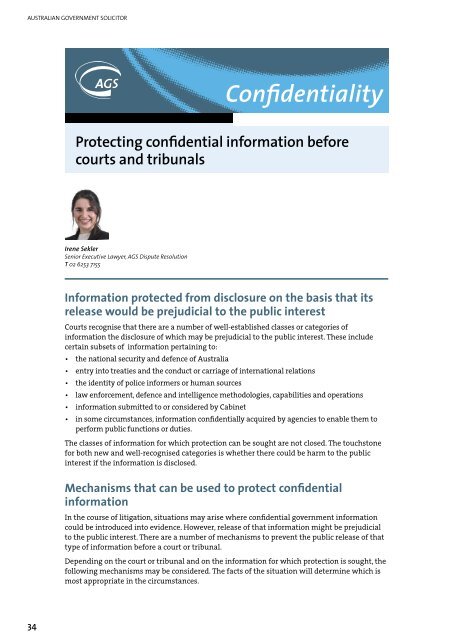Government Solicitor
AGS-magazine-Issue1
AGS-magazine-Issue1
Create successful ePaper yourself
Turn your PDF publications into a flip-book with our unique Google optimized e-Paper software.
Australian government solicitor ISSUE 1: 2016<br />
Protecting confidential information before<br />
courts and tribunals<br />
Irene Sekler<br />
Senior Executive Lawyer, AGS Dispute Resolution<br />
T 02 6253 7155<br />
Confidentiality<br />
Information protected from disclosure on the basis that its<br />
release would be prejudicial to the public interest<br />
Courts recognise that there are a number of well-established classes or categories of<br />
information the disclosure of which may be prejudicial to the public interest. These include<br />
certain subsets of information pertaining to:<br />
• the national security and defence of Australia<br />
• entry into treaties and the conduct or carriage of international relations<br />
• the identity of police informers or human sources<br />
• law enforcement, defence and intelligence methodologies, capabilities and operations<br />
• information submitted to or considered by Cabinet<br />
• in some circumstances, information confidentially acquired by agencies to enable them to<br />
perform public functions or duties.<br />
The classes of information for which protection can be sought are not closed. The touchstone<br />
for both new and well-recognised categories is whether there could be harm to the public<br />
interest if the information is disclosed.<br />
• A public interest immunity claim. Public interest immunity is a common law principle which<br />
allows a court or tribunal to exercise its discretion to exclude information from evidence<br />
where disclosure of that information would be contrary to the public interest. Public<br />
interest immunity applies to pre-trial disclosures, including discovery, interrogatories and<br />
subpoenas, as well as to material sought to be adduced into evidence. It is also available for<br />
administrative processes, such as the execution of warrants and coercive powers.<br />
• An application to have evidence excluded under s 130 of the Evidence Act 1995 (Cth) or<br />
similar provisions in other Acts. In proceedings to which the Evidence Act applies, s 130<br />
gives a court power to make a direction that information relating to ‘matters of state’ not<br />
be adduced as evidence. This direction may be made if the public interest in preserving the<br />
confidentiality of the information outweighs the public interest in admitting it into evidence.<br />
Similar sorts of provisions can be found in other laws or rules of court.<br />
• Implementing a protective order regime. The court or tribunal may be able to implement<br />
a protective order regime that allows for limited disclosure of the sensitive information<br />
while protecting the public interest. The kinds of orders that may be sought include orders<br />
concerning non-publication of evidence or other material, orders closing the court or tribunal<br />
while evidence is given or submissions are made, orders concerning the use of pseudonyms<br />
and ciphers, and orders concerning the screening of witnesses. The exact capacity of the<br />
court or tribunal to make the orders and the test for making such orders varies depending<br />
on the jurisdiction and the empowering legislation, but the broad underlying principle is<br />
generally whether the orders are necessary to secure the proper administration of justice.<br />
• Invoking the National Security Information (Criminal and Civil Proceedings) Act 2004 (Cth).<br />
The Act establishes an important and useful framework for protecting national security<br />
information in court proceedings. National security is defined, in s 8, to mean Australia’s<br />
‘defence, security, international relations or law enforcement interests’. Section 10<br />
defines ‘international relations’ as ‘political, military and economic relations with foreign<br />
governments and international organisations’.<br />
Mechanisms that can be used to protect confidential<br />
information<br />
In the course of litigation, situations may arise where confidential government information<br />
could be introduced into evidence. However, release of that information might be prejudicial<br />
to the public interest. There are a number of mechanisms to prevent the public release of that<br />
type of information before a court or tribunal.<br />
Depending on the court or tribunal and on the information for which protection is sought, the<br />
following mechanisms may be considered. The facts of the situation will determine which is<br />
most appropriate in the circumstances.<br />
34 35


